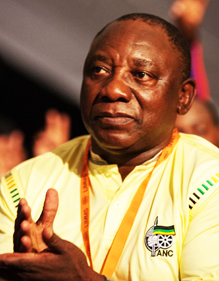
Deputy ANC president Cyril Ramaphosa is off the hook for the moment as he’s not been asked to serve in government yet – and ANC officials don’t have to declare their business interests to the party. But, if he is made a public representative or a member of the executive within the government, he’ll have to comply with parliament’s disclosure requirements and the executive code of ethics.
Scandals making headlines in 2012, however, point to little adherence of even these obligations. One matter involved speaker of Gauteng legislature Lindiwe Maseko, who landed in hot water for a catering deal for a gala dinner at the opening of the legislature, which was hosted at the Coca-Cola Dome. The Dome's official catering company, Delmont Caldow, is partly owned by Maseko's daughter Edna.
“The legislature has officially said it was pure coincidence that the gala dinner was hosted at the Dome, but … legislature secretary Peter Skosana said they had not been aware that the speaker's family had links to Delmont Caldow,” The Star newspaper reported on 2 March 2012.
NGO Corruption Watch issued a statement shortly afterwards asserting that the speaker and members of her family should not own a company that is an actual or potential service provider to the Gauteng legislature.
The watchdog added that Maseko and her family should either give up their interests in the company, or she should give up her role at the legislature. "What she can't do is remain on both sides of a contract, and no amount of declaring will resolve that," Corruption Watch said.
Maseko was eventually cleared of wrongdoing due to declaration of interest forms being outdated. But the speaker’s case is merely the tip of the iceberg.
Cosatu’s general secretary Zwelinzima Vavi spoke out strongly on this issue at the International Anti-Corruption Day roundtable discussion at Unisa on 10 December 2012, declaring that the biggest threat to South Africa’s democracy is the conflict of interest entered into by government leaders.
Vavi added that delegates at Mangaung should adopt a resolution to ban all public officials from doing business with the government, and to extend that to political leaders in the ANC and its alliance partners as well.
“The principle here is that if you are a leader in your organisation, whether it’s the ANC or the union, you must not do that and be in private business at the same time. It is inevitable that there will be conflict of interest. Even if you have left those private businesses, you must not allow your family to be in there as well,” said Vavi, who at this event accepted his appointment as chairperson of the National Anti-Corruption Forum.
Cyril’s conflict
If Ramaphosa is elected into government, perhaps even taking a place in the presidency if popular speculation is anything to go by, he’ll have a lot of manoeuvring to do to ensure he stays on Vavi’s good side.
“The past year has seen a dramatic escalation of Mr Ramaphosa’s wealth. From last year to this, his worth rose 39% to R3.1bn. This is according to the Sunday Times Rich List, which measures wealth on the basis of an individual’s holdings in listed companies,” Business Day reported shortly after his appointment in late 2012.
“A glance at the holdings of Shanduka, in which the Ramaphosa Family Trust owns 30%, reveals a large and diverse range of interests across almost every sector. In the financial sector, these include holdings of 1.2% in Standard Bank, where Mr Ramaphosa is also a director, 7.8% in Alexander Forbes and 1.5% in the Liberty Group,” the report continued.
Shanduka also owns part of Bidvest and has interests in the telecom sector in South Africa and Nigeria. It also has a 32.7% interest in a cellphone tower building operation in Nigeria — Helios Towers — and 12.5% in Seacom, which constructs undersea cables, Business Day reveals.
“The highlighted conflicts of interest include that Mr Ramaphosa is chairman of MTN Group, the majority owner of the Nigerian operation. But the company has said Mr Ramaphosa excluded himself from all the discussions relating to Shanduka’s purchase of shares in MTN Nigeria,” the report added.
Shanduka also has sizeable interests in mining, including being an empowerment partner to embattled platinum miner Lonmin; as well as in the steel industry; paper and packaging; and the energy sector in both South Africa and Mozambique.
“Most well-known to the public is Mr Ramaphosa’s 70% holding in McDonald’s SA and 70% in one of three bottling plants for Coca-Cola. With such a vast network of investments, it is inevitable that Mr Ramaphosa will find himself running into conflicts of interest,” Business Day reported.

